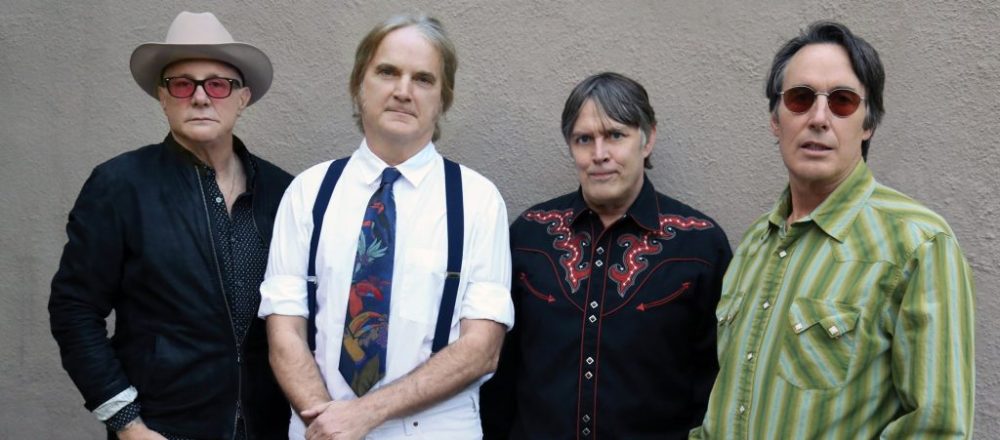Interview: The Long Ryders – Back In The Saddle Again
Last week Paisley Underground scenesters and Americana pioneers The Long Ryders released their first studio album in over 30 years.
Psychedelic Country Soul finds band leader Sid Griffin rounding up the troops and creating one of the most satisfying musical surprises of this young year.
Thirty years after their initial demise, The Long Ryders are being hailed as the forerunners of modern alt.country music.
The 13th Floor’s Marty Duda rang up Griffin, now based in London as a music journalist, and talked to him about the Long Ryders’ reunion and their place in modern Americana.
Click here to listen to the interview:
Or, read a transcription of the interview here:
MD: Speaking of Americana, I mean, do you guys feel like you kicked off that whole thing?
SG: A link in the chain, Marty, The Long Ryders were a link in the chain of Americana. We certainly didn’t start it. I mean, Elvis’ Sun Records singles like That’s Alright (Mama), Blue Moon Of Kentucky – I’m Left, You’re Right, She’s Gone, and all that stuff is Americana.
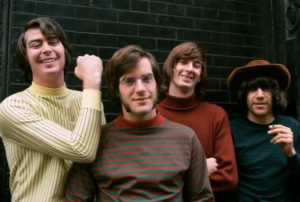
And thew band everyone forgets about is The Lovin’ Spoonful of the 1960s, their Fishin’ Blues, and a lot of jug band music and R&B kind of things, mixed with jug band music, and country & western, you know, Lovin’ You and Darling Companion, that were like, country & western hits for people like Johnny Cash. The Lovin’ Spoonful were a huge Americana link in the chain…pre-‘The Band’. People always talk about Robbie Robertson and The Band. But I think that the Lovin’ Spoonful would be a huge one, and then by the time we get into The Eagles and The Flying Burrito Brothers and all that crowd, you sort of see it.
When the Long Ryders came out, it was pretty much dead. I mean, it didn’t exist so much, what we call Americana. And if it did, it was on obscure labels and no one cared. I mean, I
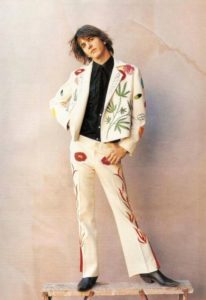
remember when The Long Ryders started to happen, we’d go somewhere and I’d say Gram Parsons, particularly in Europe, and nobody, and I mean nobody, under 35, or maybe even 40, knew who Gram Parsons was. Nobody. They all said, “Graham Parker?”. You couldn’t talk to ‘em. I know Graham Parker, I love Graham Parker! I’m not putting him down, but I’m just saying. It was incredible. So the Long Ryders were an important link in the Americana chain. That’s the best way to look at it.
MD: Speaking of Gram Parsons, I was wondering, did you ever get a chance to see him perform?
SG: No, I never did. I was just saying in the day, I never saw The Burritos perform except on TV, and I was a fan in the day. I don’t remember that the Burritos, or Gram with Emmylou – ‘cause Gram only did a handful of dates solo after the Burritos, and of course during the Byrds thing, I wouldn’t’ve been aware that it was 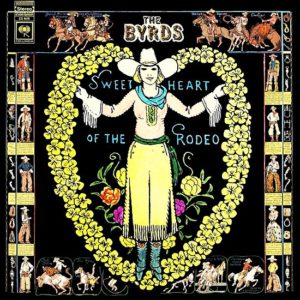 Gram Parsons on stage. I had Sweetheart Of The Rodeo when it came out, and thought it was great, and uh, I saw he was a fan. I knew who these guys were, as a young teenager, and uh, I never saw Gram live. I saw (Chris) Hillman live, sometime, I think it was his later set… I saw him in August ’76, promoting his first or second album, solo album on Asylum, in a little club that was not sold out in the San Francisco Barrier, and he was terrific, and I just couldn’t believe it. And uh, that’s as close as I got to Gram.
Gram Parsons on stage. I had Sweetheart Of The Rodeo when it came out, and thought it was great, and uh, I saw he was a fan. I knew who these guys were, as a young teenager, and uh, I never saw Gram live. I saw (Chris) Hillman live, sometime, I think it was his later set… I saw him in August ’76, promoting his first or second album, solo album on Asylum, in a little club that was not sold out in the San Francisco Barrier, and he was terrific, and I just couldn’t believe it. And uh, that’s as close as I got to Gram.
MD: I see. Now, of course, you guys have your own new album out, the first one in 32 years, Psychedelic Country Soul, and of course, the backstory is, that your former roadie, Larry Chatman, had arranged for you to have some studio time. But of course, just, dangling studio time in front of you, I imagine, doesn’t necessarily mean that the band is gonna reunite. So, why did you guys finally decide to get together and record at this point? Rather than… I mean, you guys have been reunited several times.
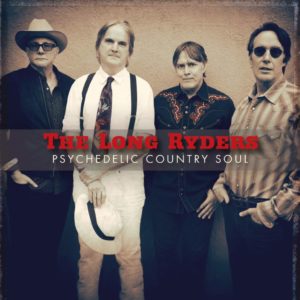 SG: We’ve done a handful of reunion tours over the years, but I thought – we didn’t play for 17 years, so we did in 2004, we did a proper two-week tour of Europe, and then we played Atlanta in 2009. And I thought, well, that’s it, we’re never gonna play again. Period. Anywhere. And then, within five years… more, and more, and more offers to play live came up. So we did a short tour of Spain in December 2014, and it went really well. Like five gigs. With a big festival. And then in 2016 we did a proper tour of Europe. We did two long weekends, East Coast and West Coast. Five gigs apiece, in America. So, it was just that small amount of touring. I don’t think that’s a total of fifty dates over five years. That’s nothing.
SG: We’ve done a handful of reunion tours over the years, but I thought – we didn’t play for 17 years, so we did in 2004, we did a proper two-week tour of Europe, and then we played Atlanta in 2009. And I thought, well, that’s it, we’re never gonna play again. Period. Anywhere. And then, within five years… more, and more, and more offers to play live came up. So we did a short tour of Spain in December 2014, and it went really well. Like five gigs. With a big festival. And then in 2016 we did a proper tour of Europe. We did two long weekends, East Coast and West Coast. Five gigs apiece, in America. So, it was just that small amount of touring. I don’t think that’s a total of fifty dates over five years. That’s nothing.
But with just that small amount of touring, Marty, I told – the guys came to me, and I actually had to agree – I can’t play these songs anymore. Because the next tour, we’re gonna play the same songs, and then that’s just it? And so, we just sorta hit a wall. And somebody said, “We gotta make a record.” And at that time, Larry Chatman called, and said, “I know how to pay you guys back for being so nice to me in the old days.” I just thought he was gonna have me – buy me lunch – because he’s done well with Dr. Dre – I thought, you know, there was an outside chance he might buy me a guitar. He might just throw a thousand-dollar bill on the table and say, “Pick a guitar,” or something. You know what I mean. He’s done very well with Dre. Anyway. Then he said, “How about a week free in Dre’s studio, our studio, to record an album.” Actually, I think he said ‘EP’. And I told the guys, and they all said, “Let’s just do an album, let’s just go for like eleven or twelve songs.” And we did. It was extremely stressful to get it done in that amount of time, but we’ve done it and it’s a good record, and the reviews are fantastic. So I’ve read like two reviews that give it sort of a B+, if you will, and every other review is an A- or better.
MD: And of course, you being a music journalist, you probably pay more attention to the reviews than the average musician. Would that be a fair statement?
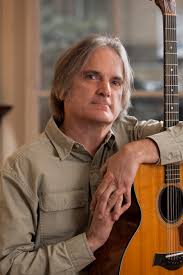
SG: Well, I – I can tell you that when I read a record review of the Long Ryders, or almost anybody, but certainly my own solo stuff, or the Long Ryders, or whatever project I’m doing, I can tell if the guy’s heard the record. Sometimes they turn it in the background once, and they just sort of rewrite the press release.
MD: Yeah, yeah, yeah.
SG: And sometimes I really tell that this person’s listened to the album six times and they love it, and know all the stuff about it, blah blah blah. So I can give you that much, sure.
MD: Yeah, yeah. Yeah. You do wonder how much music gets listened to, these days. Just in general, or if people are just skippin’ through.
SG: Well, there’s so much out there. The glut of music is incredible. One of my little fun facts is, in 1975, you know, x amount of new albums came out. And because everybody can make an album in their bedrooms, um, there’s something like six-and-a-half times the albums released, that were released in 1975. I mean, there’s just, this huge glut of albums, of all these tiny little indie labels and the majors, and so – I’m talking new artists. I’m excluding re-issues. There’s over six times as many albums coming out as came out in 1975. So how can anybody keep up? And I’m sure that – even though if someone’s a music fanatic like myself, I’m sure the great Sid Griffin is unaware of a beautiful Americana band, be it from Tennessee, or Wellington, or, uh… you know, uh, Hong Kong. Sure. There’s just no – you can’t keep up with all this. It’s just stunning, with how much stuff’s out there.
MD: So, when you guys got back in the studio for the first time, what was the vibe? What was – how did it come together?
SG: Well, we learned the songs – because the beauty of the Internet is, we learned the songs… we agreed on the songs and we learned the songs at home. So, everyone – we had two days of rehearsal in L.A. before we went into the studio. We got to a, uh, just a smelly rehearsal hall in the San Fernando Valley, I think it was one of those bands, like Queens Of The Stone Age is auditioning new singers next door, and on the other side of us was somebody – you know, not the Smashing Pumpkins, but it was somebody really famous like that as well. Oh yeah! And there was another studio where we were, and one of the Mötley Crüe guys was trying out a new band or something, and – so we had a band, and nobody knew who we were, and the other three studios of rehearsal, were like bang bang bang, with all this forceful rock ‘n’ roll, and they were somebody you heard of sometime. And we were in this one room for two days, and everyone knew how they went. I mean, the first pass to some of the songs was fairly decent, so I knew we – I knew we’d have a good record. We did, and Ed Stasium was there, the producer of The Ramones, and The Smithereens, he had great success with both acts. So he was our producer, and he heard the rehearsals, and he said, do this, do that – Sid, you do this, you do that, and we did. It was just… what I meant by stressful earlier was – doing a full album in seven days is impossible. We got an eighth day from Larry. I went in his office after two or three days and begged him, and he gave us an eighth free day. And then after that, Ed mixed in his house, and there were some percussion overdubs at his house, and he overdubbed a handful of things in Virginia, and that was it. We just made a record. There you are.
MD: There you go! Simple as that. But you had to have some songs, that – so everybody seems to have contributed songs to the record.
SG: Yeah, all four did.
MD: Did you guys have these songs in mind for something like this?
SG: No. No –
MD: Were they written specifically for the record?
SG: Someone else asked me that, and I had to check with the guys. Every song was written for this record.
MD: Ah.
SG: None of the songs were previously written – where somebody thought, “Oh, that’s a good song, I’ll save it for some worthy project.” No. They were all songs written for The Long Ryders album. Every single one of them.
MD: Ah. And when you write a song for The Long Ryders, as compared to anything else, what does that entail, from your point of view?
SG: We have a certain amount of punch, or drive, that has to be in the song. Impact. That doesn’t necessitate beating the heck out of the snare, or turning your amp up to eleven. It’s just something that has to be in the song itself. And we have a lot of subtle – or I like to think, subtle – political lyrics without hitting anybody over the head or making ‘em feel that, because they believe something different politically, that they’re left out. Those are two key marks of the band. And every once in a while, somebody – I notice there’s not too many on our record – once in a while there’ll be some slight in-joke in one of the lyrics. That wasn’t so prevalent on this last record I guess, cause we’ve not made a record in – somebody was saying we hadn’t made a record in 33-and-a-third years, and that made me laugh… meant to do the joke, but it was one of the commentators on the BBC who said it, and I just died of laughter. I didn’t see why I was laughing, but anyway.
MD: It’s better than forty-five, I guess.
SG: Yeah, better than forty-five! If we waited ‘til forty-five [years], I’d be … whoa.
MD: And the music business has changed immensely since the last time you made a record, so did you have to make any – did you have to think about that at all? How this record was gonna get heard?
SG: Oh, sure, you’ve got to realize that there’s streaming now. Whether we like it or not. And streaming doesn’t pay beans. I’m not trying to tell you anything you don’t know, and I bet most of your listeners – or at least many of your listeners –who have some inkling of the record industry, or perhaps [they’re] in bands as well. They know, it just doesn’t pay beans. And I had a solo song called Sharleen, which is based on Sharleen Spiteri of Texas. It’s a brighter song for a girls’ night. So I wrote this song. And the publisher, they got a minor cover with it, and my version – I put the demo on Spotify. Long story short, it got four – in one month, one 30-day period, it got 40,017 plays – four zero, comma, zero-one-seven, and when I saw that, I thought, “Oh my God, that’s amazing! In one thirty-day period! What do you get for that?” I got 28 quid… I got twenty-eight English pounds. That’s it.
Now that means, you’re getting like, a thirteenth of a penny. So Spotify… if Spotify just paid me, you know, a penny, I’d have gotten 4,000 quid. It’s just pathetic, Spotify and those services. They’re necessary, it’s the way the industry is, but I wish that we could somehow get them to pony up. It’s just pathetic. Cause anyone would listen to that song for a penny, come on.
MD: Yeah, I agree. It just seems absurd, the whole scenario. Hopefully it’s a period of transition rather than just the way it’s settled into. I don’t know.
SG: Oh yeah, I agree. And also – also, to be honest, when The Beatles went on Spotify, they didn’t get one-thirteenth of a cent. You can bet the ranch, that they – when they went to Spotify, they went, “Do you want The Beatles? You gotta pay whatever it is.” Like 4 cents a song to play or whatever the hell it is. But the fact of the matter is the vast majority of Spotify, I mean like 98% of us, we’re getting clobbered. And Drake, you know, who’s getting eighteen million plays in a 30-day period, he’s making some money. But even the handful of—and I know this from a guy in the industry, who’s in publishing, he says other than Drake, and about twelve people in the industry, Spotify’s killing every single [one] of their artists.
MD: Yeah. Not good. And… in addition to all the original tunes on the album, you’ve covered Tom Petty’s Walls. Why – what made you choose that one out of the vast array of songs you could’ve covered?
SG: When I first saw Tom Petty And The Heartbreakers [in] December 1977 at the Whisky A Go-Go, they were no more famous than I am. And… they were popular – I think the Whisky was sold out – but they were not famous. And by… yeah, that summer, certainly that next summer, they were selling out the Greek Theatre, and on their way. And uh, he… acknowledged The Long Ryders, and once paid to see us, in the early days.
MD: Ooh.
SG: And then when we did a benefit concert – we backed up Chris Hillman on four songs at a benefit concert. Long story short, there was a friend of ours who had bone cancer, a big mainstay of the L.A. record industry, and she was – she didn’t have health insurance. And so uh, there’s a benefit, and a lot of bands played. Dweezil Zappa played. A couple of the guys in Duran Duran did some songs, and we backed up Chris Hillman on four songs. And… Petty came to that and just hung out. He was – he was calling us by first names and just a lovely guy.
 And then when we made the final album in 1986, ’87, we had an album called Two-Fisted Tales, Marty, and I – at 3am, I was so tired of listening to this one song, I went down the hall, and I was reading the L.A. Times. And I had the L.A. Times in front of my face, and this guy came in the commissary, where I was having a cup of coffee to stay awake, and I couldn’t see him because I had the L.A. Times in front of my face. And I heard this Southern voice go, “Hi Sid, how are you. Is everything going great?” And I thought, “Who the hell is this?” And I put the paper down and it was Tom Petty, like we were old friends! They were making that album – Let Me Up (I’ve Had Enough), next door. And I said, “How’d you know it was me?” And he says, “Well, I could tell by your shoes. ‘Cause I saw you walk in the studio earlier.” So he was just a great guy. A really great guy.
And then when we made the final album in 1986, ’87, we had an album called Two-Fisted Tales, Marty, and I – at 3am, I was so tired of listening to this one song, I went down the hall, and I was reading the L.A. Times. And I had the L.A. Times in front of my face, and this guy came in the commissary, where I was having a cup of coffee to stay awake, and I couldn’t see him because I had the L.A. Times in front of my face. And I heard this Southern voice go, “Hi Sid, how are you. Is everything going great?” And I thought, “Who the hell is this?” And I put the paper down and it was Tom Petty, like we were old friends! They were making that album – Let Me Up (I’ve Had Enough), next door. And I said, “How’d you know it was me?” And he says, “Well, I could tell by your shoes. ‘Cause I saw you walk in the studio earlier.” So he was just a great guy. A really great guy.
And we wanted to do a song – I didn’t realize when Greg and I, the drummer, Greg Sowders? When we picked that song, I didn’t realise as many people were familiar with it as they were. Glen Campbell had already done like, four or five years ago, a brilliant cover of it, and there’s another band from America, that escapes me, they’ve done a cover of it as well. I thought we were picking more of what we call a deep cut… but it doesn’t matter. It’s a very heartfelt tribute – he was a great guy, I mean, we all liked him. We didn’t know him uber-well, but – we weren’t like close buddies – but every time I met him he was a great guy, very fond of the band, so we thought we’d do a little song in his honour.
MD: Yeah, I think his death took a lot of people by surprise, and shock – I mean, he’s one of those guys you think is always gonna be around.
SG: Well, he’s only three and a half years older than I am. Four years older than I am. And he went on that final tour with a bad hip. They told him, “You have to let the doctors look at it,” – and he said, “I’ll get that done, just when I’m off the road.” So the final tour – he played in no little pain. He played that final tour in no little pain. He was not grooving, as we say in Los Angeles.
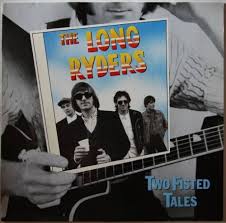 MD: Yeah. Now, the other thing you guys were up to, besides putting out this new record, is that you’ve put out some re-issues. I was wondering what it was – what it was like for you to go through – I know Tom did a lot of the archiving and stuff, but you’ve done some liner notes and stuff for Two-Fisted Tales, what were your thoughts looking back at this stuff after so long?
MD: Yeah. Now, the other thing you guys were up to, besides putting out this new record, is that you’ve put out some re-issues. I was wondering what it was – what it was like for you to go through – I know Tom did a lot of the archiving and stuff, but you’ve done some liner notes and stuff for Two-Fisted Tales, what were your thoughts looking back at this stuff after so long?
SG: Um, I was pleased—you can… after thirty years, or even after a few years, you know, you can tell what part of your records – what songs are good, what songs are bad. When you’ve made the record, anyone who says they know exactly is lying – it takes a while. I’m sure that even – another guy who passed away, Prince, I’m sure that he didn’t really know – oh, I don’t know, on his Black Album, or Under The Cherry Moon soundtrack, which songs are gonna stand the test of time. And it’s interesting to go back and listen, and then you do realise what songs are gonna stand the test of time. It becomes obvious when you go back and listen. So that was fun. And, other than – I looked as if it was done, uh, we’d gone over our catalogue, and I realised, we don’t have that many, you know, howlingly bad songs. Most Long Ryder songs are respectable, and they won’t scare the horses or the children.
MD: Right.
SG: But, we have a couple of clunkers in there. I admit that. But, I was pleased that quality control of The Long Ryders is fairly high.
MD: And you have live shows intermixed in there as well. So that must be another thing to account for.
SG: Tom – our bass player Tom Stevens is like the Rolling Stones’ Bill Wyman – he kept everything. You know, we would play – I remember when we played this… one of the gigs that came out, it was on the, um… oh, I don’t know, it was on one of these re-issues, it’s a Dutch – or maybe it’s a Belgian live show, and it’s really great. And I can remember Tom 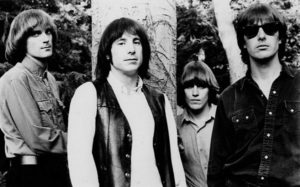 went around to the truck, it was broadcast on the radio. And Tom went around to the truck and said to these guys, “We want a copy before we leave.” And they were all hemming and hawing, and went, “Look. We just broadcast it, what do you care?” [He said] “We want a copy.” And they gave him a – I can’t remember what the format was. It wasn’t a mere cassette, it was something really good. Anyway, they gave him a copy, and I thought, “What the hell do we need that for?” Well, thirty-three years later or what-have-you, I found out!
went around to the truck, it was broadcast on the radio. And Tom went around to the truck and said to these guys, “We want a copy before we leave.” And they were all hemming and hawing, and went, “Look. We just broadcast it, what do you care?” [He said] “We want a copy.” And they gave him a – I can’t remember what the format was. It wasn’t a mere cassette, it was something really good. Anyway, they gave him a copy, and I thought, “What the hell do we need that for?” Well, thirty-three years later or what-have-you, I found out!
MD: I mean, did you think when you were making this music back then, that it was something that was gonna be important thirty-three years later?
SG: No. When we broke up, it was tough for about three years. Really tough. Sort of like…the scarlet letter. You’re in a band that failed. And a lot of places in Hollywood, where I was living in California – I was living in Hollywood – not near, I was in it. A lot of places where I was on these permanent guest lists suddenly, quietly, took my name off. So I would just go to some hot nightclub, and say “I’m Sid Griffin,” and get told, “I’m sorry, you can’t come in anymore. You know, you gotta pay now.” And – so it was tough! And the ‘90s, I moved to London in the ‘90s, and that was tough, and sometime around 2004, 2005, it just started getting easier.
The people started talking about The Long Ryders, and…I liken it to a sundial. It comes all the way around, it just takes a long time. If you stare at the sundial, it looks like the shadow is hardly moving. It’s making the time of day apparent. If you just wait, it comes around again. And that’s kinda what happened I mean, I remember the – in the – throughout the late ‘60s, ‘70s, I guess into the ‘80s, no one cared – not no one… but the early Beatles catalogue, the I Wanna Hold Your Hand era, was considered in America to be vastly inferior to sort of Rubber Soul, Revolver onwards. Which was considered adult. And now people have a perspective and realise that some of that stuff is just as brilliant as anything on The White Album. So time – time is like a filter. It really sifts through and allows you to see what’s valid. You know, I look back – and my parents are gone. And when I look back on my parents, I now realise what is valid about them. Because they’re gone now, and I have a much, much deeper, more loving perspective.
MD: Mm. And, speaking of The Long Ryders’ legacy – where do you see that legacy showing up in other contemporary artists these days? Who do you hear that you go, “Ah!”?
SG: Well, there’s a band like The Sadies, who are on Yep Roc, who say how great The Long Ryders were – what a great influence they were – and that’s nice. And, it’s really – it’s like, for instance, Wilco, or Son Volt, those guys – Jay Farrar and Jeff Tweedy, were working in the St. Louis, Missouri record store when we got there, and we inspired them to 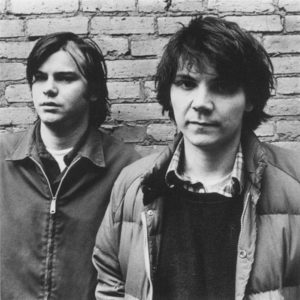 drop the punk rock – they were kinda like Black Flag. Perfectly wonderful band. But they weren’t like us. So they persuaded those guys to drop the punk thing, and do this – if you will, Americana. And, The Jayhawks opened for us at Second Avenue, in Minneapolis—Saint Paul. And I think – they had an album out, and it was good! But I think we gave them the impetus to really go for it, and sell some records. And – cause we were already touring the States, and they were sort of a local, regional band, doing well. And then – The Black Crowes – Chris and John Robinson of the Black Crowes were huge Long Ryders fans. They were the opening act for The Long Ryders in a band called Mr. Crowe’s Garden, In Mr. Crowe’s Garden, Chris Robinson and his brother had short hair, and they were very influenced by R.E.M. Very early R.E.M. sound, if you remember an album like Murmur.
drop the punk rock – they were kinda like Black Flag. Perfectly wonderful band. But they weren’t like us. So they persuaded those guys to drop the punk thing, and do this – if you will, Americana. And, The Jayhawks opened for us at Second Avenue, in Minneapolis—Saint Paul. And I think – they had an album out, and it was good! But I think we gave them the impetus to really go for it, and sell some records. And – cause we were already touring the States, and they were sort of a local, regional band, doing well. And then – The Black Crowes – Chris and John Robinson of the Black Crowes were huge Long Ryders fans. They were the opening act for The Long Ryders in a band called Mr. Crowe’s Garden, In Mr. Crowe’s Garden, Chris Robinson and his brother had short hair, and they were very influenced by R.E.M. Very early R.E.M. sound, if you remember an album like Murmur.
MD: Sure.
SG: And when they saw us, they started thinking – “No, let’s get a little more raucous than this,” and turned their guitars up. So that’s kinda where I see The Long Ryders’ input. I mean, it’s – very touching, it’s very touching.
Click here to read The 13th Floor review of The Long Ryders’ Psychedelic Country Soul.
